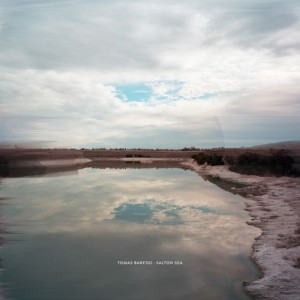Listening to Tomas Barfod’s excellent full-length debut for LA-based Friends of Friends, Salton Sea, I start to wander about house music’s contentious balance of songwriter and producer. Barfod is most recognizable for his role as drummer in Danish indie electro outfit WhoMadeWho, and while those indie leanings bleed through in the construction and arrangement of many of Salton Sea‘s tracks, it’s never in fear of compromising the Dane’s role as producer.
Historically, populist leanings, especially from someone not born and raised in clubs, can sit as a point of contention in dance music. Slapping fully-formed hooks and verse-chorus-verse structures onto a techno or house foundation instead of simply alluding to them in at-arms-length snippets is usually a sign production detail is being checked at the door in favor of a more crowd-pleasing outlook. Perhaps a more-often-than-not validated prejudice, but a prejudice all the same. Yet, right now, in 2012, with its bug-eyed, defensive survival instincts kicking into high gear, dance music’s mind is wide open.
Despite Salton Sea‘s straight-faced, non-reappropriated pop and indie overtones, the record still plays close to the chest with its tech house inclinations. My first time through I was barely cognizant of the fleshy hooks each song pivots around, but given time to sink in, the bookishness of Salton Sea’s allegiance to melody and structural deference becomes the record’s sticking point. Barfod points toward an obsession with the archetypical wasteland and urban decay as inspirations for Salton Sea‘s thematic focus, which crops up in the album’s patient, meditative foundations, but is harder to spot in the overall tone. The record is all slinky, glistening arpeggiated bass lines, cloudy, perspiring synth textures, chittering percussion detail, and organic instrumentation flourishes but as a whole Salton Sea never really sticks to any one song outline, whether tonal or aesthetic. And despite the bigger, naturalistic aspirations, the record always feels individual, private, and personal whether it’s humming to itself or finding some blue-sky hugeness.
The trio of songs that open the record is about as diverse as the LP gets. “D.S.O.Y.” is a gaseous, burnt tropical disco romp, all rounded edges and bubbling shapes, while “Broken Glass” is introverted, whispering bedroom electro and “Came to Party” is a lazy, stomping straight-up, synth heavy house ode, true to its name. “Broken Glass” is the first live vocal-centric track on an album that alternates between vocal-lead and instrumental every other song, and it’s easy to skip over the attention paid to its arrangements. The cut grabs at sonorous french horns, warbling guitar plucks, and chiming Pantha Du Prince-esque percussion in a mash of almost the most traditional indie instrumentation and the small scope, big feelings electronic music of artists like Balam Acab or Barfod’s label-mate Shlohmo before the track bounces into a 4/4 dance cut again.
The alternate, vocal/production-centric album sequencing works well with the flow of tracks like “Till We Die” and “Ecstesizing”. The former is an organic, collage of woody and reflective textures working within nooks and crannies as vocalist Nina Kinert breathes cold smoke over it, while the latter builds, bursting into slowly roiling waves of atomic color, spreading out beyond the limited confines of the track that came before it. Structurally Salton Sea, whether vocal-driven or not, is usually busy trekking through more song-oriented turns before finding a place of climactic tumult. “Don’t Understand” has a beautifully executed skipping-sample breakdown before blowing up into jerky dance floor abandon. Standout “November Skies,” the most realized pop cut on the album (and, honestly one of the best dance tracks of the year), with its tom-heavy drum fills, twinkling intricacies, and serrated fingers-high synths, is an upward climb for the whole of its six minutes, Nina Kinert bringing down the house with some exultant “ohhhs” at the track’s upper-atmosphere zenith.
Salton Sea is a wholly unexpected delight. It’s ambitious, diverse, unique, and tonally and aesthetically complex. It’s an album packed with as much immediacy and surprise as it is with re-playable intricacy. It finds fitting company on Friends of Friends with Shlohmo and Ernest Gonzales, guys who’ve carved out a singular, impressionistic sound within thriving, over-defined realms of dance music. It’s delightfully difficult to try and find a larger place for Salton Sea. It’s as much of a techno or house record as it is a pop or loner electronic one, but doesn’t feel right belonging to any of those worlds. In a year full to the brim with excellent, genre-defying debuts, Salton Sea ranks pretty darn high.

